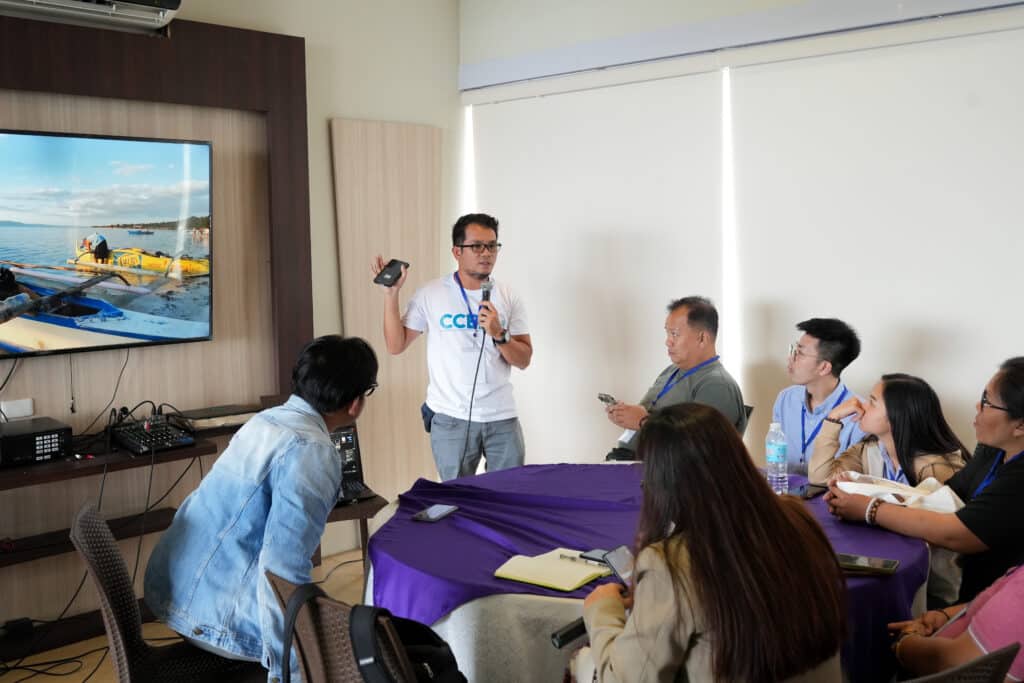
CCEF’s Nicholson Tan, discussed the significance of environmental journalism to the members of Visayan media during the learning exchange program in Tagbilaran City, Bohol last October 29. | Photo courtesy of CFA
CEBU CITY, Philippines — Several members of the media and civil society organizations (CSOs) in the Visayas region recently met in Tagbilaran City, Bohol, to formulate the Visayan agenda for the ‘Inspire’ project.
The event, titled “Amplifying Local Voices,” is led by the Communication Foundation of Asia, the US Agency for International Development (USAID), and the Gerry Roxas Foundation (GFA), aiming to foster collaboration between CSOs and media in crafting plans and agendas for biodiversity conservation.
READ MORE:
Marine litter: Threat to health, food security, economy, environment
Climate change to cut deep among Asia, Pacific economies in coming years
Throughout the course of the event from October 27-30, the participants have identified challenges and responses on the topics: livelihood, endangered species, climate change, sustainable development and tourism; and life underwater.
Statement
From there, the members of the media and CSOs formulated a unified vision for the Visayas region through a statement: “A diverse, abundant and regenerating ecosystem protected and managed by an empowered Visayan community for a sustainable future.”
Through the learning exchange (LEx), some members of the CSOs said that they were enlightened on how the local media works, especially in expanding the reach of the audiences as well as the limitations in the newsrooms and coverages.
LEx is an activity of the Investing in Sustainability and Partnerships for Inclusive Growth and Regenerative Ecosystems (INSPIRE) Project, which is implemented by the Gerry Roxas Foundation.
Apart from imparting their advocacies, both the CSOs and media practitioners from Eastern, Central, and Western Visayas, have collaborated to strengthen their connections and communications.
Glen de Castro, executive director of GFA, said that the role of local media is crucial in amplifying the advocacies of the CSOs as the former has the ability to “educate” people through their stories and reports, particularly in relation to the environment.
De Castro said that these educational materials can include documentaries, news segments, and social media campaigns.
Citizen journalism
Moreover, De Castro also said that citizen journalism had a vital role in the community.
“Baka po pwede nyo maengage yung community para maencourage sila na magparticipate sa citizen journalism kasi they can provide firsthand accounts of environmental changes,” De Castro said.
(Perhaps, you can engage the community so that they can be encouraged to participate in citizen journalism because they can provide firsthand accounts of environmental changes.)
He added that media could also help the local communities document their experiences in biodiversity and climate change issues.
“Kung magbibigay sila (media) ng coverage, malaking bagay po na makikita rin ng iba,” he said.
(If they give (media) coverage, there is a big possibility that this can be seen by others.)
Moreover, De Castro said that by choosing the right channel or platform to amplify the advocacy, the media has the leverage to feature success stories that would help the policymakers reinforce biodiversity conservation.
“As we move forward, maybe by working together with your communities and our team, we can create a synergy that thrives meaningful action for biodiversity conservation,” De Castro said.
In Cebu, the only members of the media invited were from DYRF Radio Fuerza broadcasting station and CDN Digital.
Some CSOs present include the Coastal Conservation and Education Foundation Inc. (CCEF) that advocated for the protection of Danajon Project which is a double barrier reef that spans several municipalities in Bohol, Cebu, Southern Leyte, and Leyte.
Aside from CCEF, present as well were representatives from the Institute for Climate and Sustainable Cities (ICSC), JCI Bohol Sandugo, University of Santo Tomas-Research Endowment Fund Inc., Bohol Provincial Environment Management Office, and Caritas Philippines.